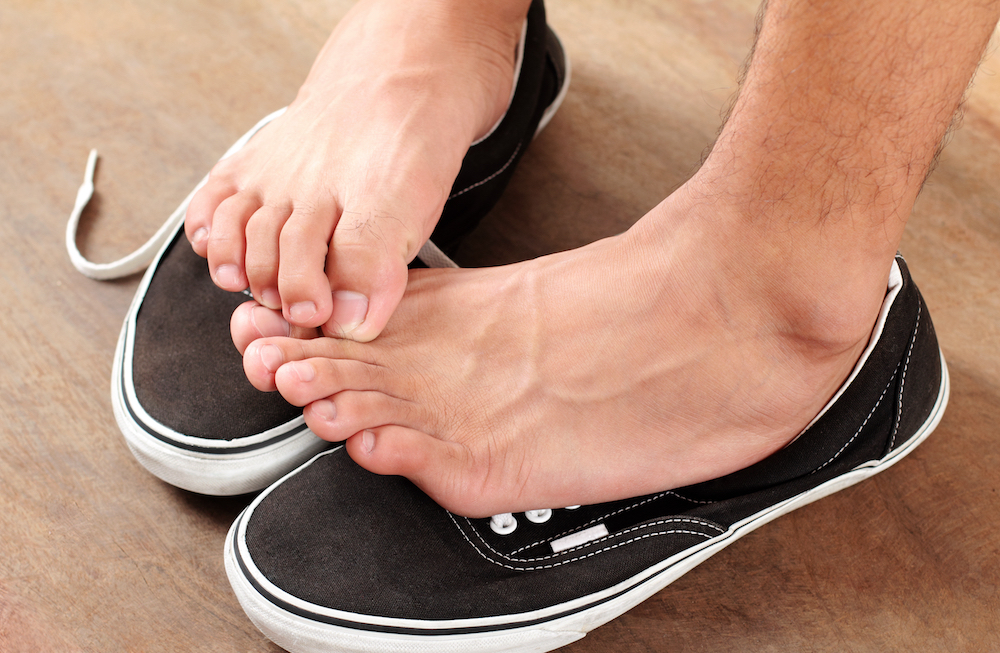What is Athlete’s Foot?

Athlete’s foot is not very pleasant to talk about, but it is very common. Despite its name, anyone could get athlete’s foot. Without treatment, you could run the risk of developing a more serious infection. If you believe you may have athlete’s foot, contact your dermatologist right away to begin treatment. There are very effective treatments available through your dermatologist that can clear the condition.
What causes athlete’s foot?
Athlete’s foot is a fungal infection that occurs on the skin of the feet. The condition got its name because many athletes come down with the condition because of how it is typically contracted. Sweating is one way in which people get athlete’s foot. It can also be contracted by showering in public areas without wearing proper foot coverings.
When your feet are sweaty, it provides the optimal conditions for fungus to grow. Inside your hot, sweaty socks and shoes, the fungus has what it needs to breed and thrive. When showering at places like a gym, there is a high likelihood that this fungus can easily be passed from person to person.
What are the symptoms of athlete’s foot?
Athlete’s foot can easily be mistaken for other kinds of ailments. In general, athlete’s foot presents as scaly, itchy skin. Some people report burning sensations and uncomfortable itching on their toes. In general, the condition will impact both feet and can even cause damage to your nails.
If you notice symptoms similar to these, consider other factors that could contribute to athlete’s foot. For example, have you recently experienced sweaty feet? Have you taken a shower at a gym or other public place? Has someone in your family had athlete’s foot? If you answered yes to any of these questions, the best thing to do is to schedule an appointment with your dermatologist so you can get a proper diagnosis.
What are some treatments my dermatologist may recommend?
Like any other fungal infection, leaving it to take care of itself will not make the situation better. In fact, without treatment a fungal infection can get much worse and even lead to a bacterial infection. The first thing you should do is remove conditions that encourage the growth of fungus. There are antifungal powders available over the counter and prescription that can help dry your foot area and remove the moisture that encourages propagation of fungus.
These kinds of powders may not be successful in treating more severe cases of athlete’s foot. Your doctor may suggest using the powder in conjunction with other topical creams that fight fungus. There are also oral medications that can be prescribed under the direction of your physician that can kill fungus system-wide.
It is recommended that you get treatment for athlete’s foot for a number of reasons. For one, athlete’s foot is contagious so by avoiding treatment you run the risk of passing it on to others, including those in your household. Secondly, without treatment the condition can worsen. It can even get to the point of other kinds of infections that can cause more serious health problems. And third, without treatment the condition will not go away. You may experience scaly, red, itchy or painful feet long into the future.
How to prevent athlete’s foot?
Treatment of athlete’s foot is necessary to relieve the immediate infection. However, you must consider how to prevent the condition in the first place to avoid issues in the future. As we mentioned, athlete’s foot is a fungal infection. Fungi grow and thrive in warm, moist areas.
The number one thing you can do to prevent athlete’s foot is to maintain clean and dry feet and footwear. Removing socks and shoes so your feet can air out regularly is important. Avoid wearing sweaty socks and shoes after vigorous exercise. Purchase moisture wicking socks. Avoid using locker room showers or going barefoot in communal shower locations.
Buckhead Dermatology of Atlanta – Healthy Skin Specialists
Athlete’s foot is an uncomfortable yet common condition that can be avoided with proper hygiene and treatment under the care of a dermatologist. If you are in the Atlanta area and require the services of a dermatologist, contact the office of Buckhead Dermatology today. With two convenient offices in Atlanta and College Park, our board-certified dermatologist can work with you to provide an accurate diagnosis and to get you on a successful treatment regimen no matter your skin condition.
